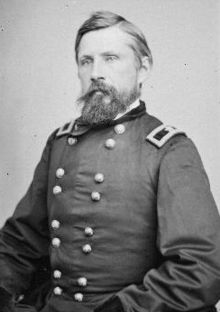Search
George Henry Gordon

Born July 19, 1823 - Died August 30, 1886
George Henry Gordon is an American soldier and attorney.
Gordon was born in Charlestown, Massachusetts on July 19th, 1823. He moved to Framingham, Massachusetts at the age of 5 with his widowed mother. He then attended the United States Military Academy and graduated in 1846. He graduated 43rd out of a class of 59 cadets.
Gordon served in the Mexican-American war. He received a brevet to the rank of first lieutenant for gallantry at Cerro Gordo.
In 1854, Gordon resigned from the Army. He took classes at Harvard Law School and begin practicing law in the Boston area.
In 1861, when the Civil War broke out, Gordon organized and become colonel of the 2nd Regiment Massachusetts Volunteer Infantry. He and his unit were assigned to guard the upper Potomac River and Frederick, Maryland. Frederick being a very active area during the Civil War. It was briefly the capital of Maryland when the Maryland legislature took up the discussion of secession. Maryland was a "slave state" and many fleeing slaves came from or through Frederick to join up with Union forces.
In 1862, Gordon served briefly under Major General Nathaniel P. Banks who opposed, unsuccessfully, Major General Stonewall Jackson in the Shenandoah Valley. The same year Gordon was appointed brigadier general of volunteers.
After Gordon's promotion, he was given command of XII Corps, Army of the Potomac. With them he served at the Battle of Antietam which was the bloodiest one day battle in United States history. There was a combined loss of 22,717 lives.
Following the Battle of Gettysburg, Gordon was given command of the 1st division of the XI Corps. With them he was stationed on Folly Island, South Carolina. Before he left the service he became part of the Department of Virginia as well.
Gordon left the Army on August 24th, 1865. The following January, President Andrew Johnson nominated him for promotion to the honorary grade of brevet major general, United States Army Volunteers. The nomination was approved by the United States Senate in March of 1866.
After retiring, Gordon returned to his law practice in Boston. He also became one of the founders of the Military Historical Society of Massachusetts. He published several books regarding the Civil War.
Gordon passed away on August 30, 1886.
Gordon was a member of Bunker Hill Lodge in Massachusetts.
This article provided by Brother Eric C. Steele.